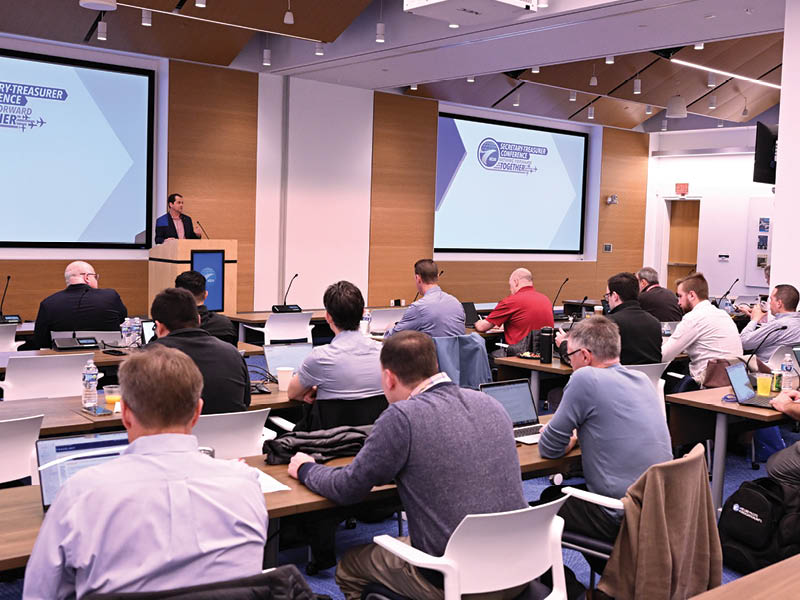Secretary-Treasurers Conference Provides Job Insights, Networking Opportunities
By John Perkinson, Senior Staff Writer

Capt. Jason Ambrosi, ALPA’s president, welcomes attendees to the Secretary-Treasurers Conference, noting that he previously served as a secretary for his pilot group and understands “how challenging your work can be.”
Helping to keeping ALPA fiscally sound is the job of the Association’s frontline secretary-treasurers, who manage budget and record-keeping responsibilities for the union’s 112 local councils. Fifty-two of these elected leaders from 28 U.S. and Canadian pilot groups gathered at ALPA’s McLean, Va., offices on March 26–27 for the annual Secretary-Treasurers Conference, which provided them with a comprehensive look at their duties, as well as the Association’s many available resources.
Capt. Jason Ambrosi, ALPA’s president, welcomed attendees, noting that he’d served as a secretary for his pilot group’s Master Executive Council (MEC). “Thank you for what you do,” he remarked, adding, “I understand how challenging your work can be.” In addition to emphasizing the important role these pilot reps play within the Association, Ambrosi reviewed ALPA’s recent accomplishments, including the 12 pilot group contracts that have been ratified since his administration took office. He also observed that through the efforts of ALPA’s Structure, Services, and Finance Review Committee, the union is channeling more of its resources directly to MECs and line-pilot activities.
“We’re the fiduciaries of the Association,” said Capt. Wes Clapper, ALPA’s vice president–finance/treasurer. “What we do allows others to do what they’re doing.” He reviewed the Association’s current financial status, noting that during the last 10 years—with the exception of 2022 due to the COVID-19 pandemic—ALPA has posted positive annual net incomes.
Capt. Sean Creed, the union’s vice president–administration/secretary, who shared moderator duties with Clapper, presented a segment on planning and preparing for meetings and the use of Robert’s Rules of Order to ensure meetings are conducted fairly and efficiently. He also discussed the development of and rules for managing virtual local council meetings. Addressing any concerns about the Association’s policies and procedures, he said, “If you don’t know, call me.”
As a part of the conference, participants reviewed ALPA’s various budgeting requirements and spending guidelines. Presentations covered government reporting responsibilities and issuing and maintaining membership rosters and reports. The secretary-treasurers also learned about the various IT applications ALPA provides to make their duties more streamlined and easier to manage.
They examined the role of the union’s Major Contingency Fund (MCF)—the Association’s “war chest”—which has traditionally been used for communications-related activities during late-game contract negotiations and other pilot group issues. ALPA recently expanded the purpose of the MCF to include contract implementation to ensure that the terms pilot groups and management agree to in collective bargaining are properly executed.
In addition, attendees heard from Strategic Member Development & Resources Department staff regarding ALPA’s biennial Board of Directors meeting, which will take place October 28–31 in Chicago, Ill., and the host of logistical considerations they should keep in mind.
The conference also featured interactive segments, including lunchtime breakout sessions, to allow participants to meet their council services coordinators and learn about ALPA’s expense and member compensation systems. They also took part in a panel discussion titled “A Day in the Life of an ALPA Secretary-Treasurer.”
“Here’s your chance to learn what other properties do,” said Clapper, who facilitated the discussion, posing questions to MEC secretary-treasurers Capt. Rick Meier (Piedmont) and Capt. Jason Roberts (WestJet) and MEC treasurer Capt. Andrew Minarcik (United). Among other issues, Meier underscored the value of negotiating piecemeal contract improvements. Since the Piedmont pilots’ last Section 6 negotiations, they’ve been able to sign more than 50 letters of agreement.
In preparing for his pilot group’s 2024 budget, Minarcik noted that he talked with various MEC committee chairs about their needs, reviewed the group’s previous budgets, and established a system for accurately tracking the United pilots’ cost centers. Roberts discussed the WestJet pilots’ labor agreement negotiated last summer, giving attention to the new MCF contract implementation policy. “It was a game-changer,” he said, adding that the additional funding helped the MEC better explain the details of the recent contract to the members, which in turn aided the Grievance Committee in enforcing the new agreement.
Throughout the panel discussion, attendees also had ample opportunity to ask questions and share their own experiences.

